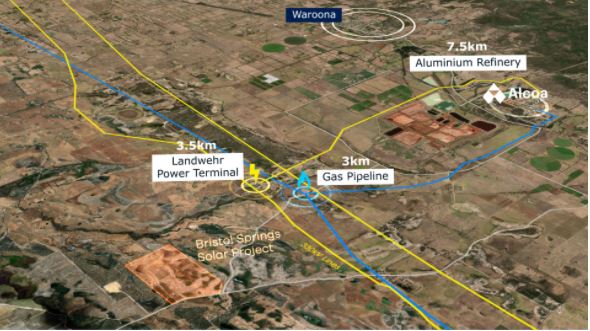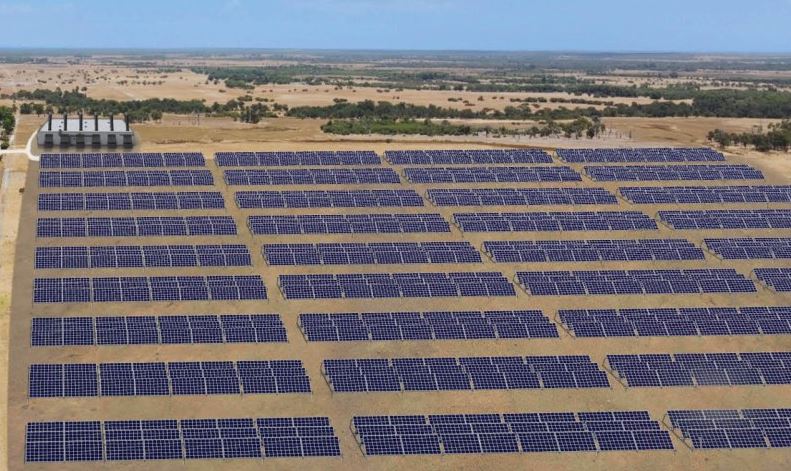Frontier Energy’s acquisition of Waroona Energy combines two large-scale Western Australian solar projects with ideal conditions and interest in producing green hydrogen.
Frontier is developing the Bristol Springs Renewable Energy Project with development approvals for a total solar generation capacity of 355 MW while Waroona has been developing the namesake 241 MW solar project on the adjacent property, about 120 kilometres south of state capital Perth.
The two companies will now be joining forces to drive their multiple value-adding initiatives forward with new chief executive and chief operations officers appointed for the newly combined company to support further development. This includes a spate of studies that are to be finalised in early 2024, including green hydrogen production, hydrogen consumption in a peaking power plant, and utility-scale battery storage.
In announcing the acquisition, Frontier said that the combined projects hold significant renewable energy expansion potential, with the company now controlling two grid connections capable of exporting more than 1 GW of renewable energy to the grid. Frontier also has freehold landholding of 868 hectares, which it said is ideal for solar, hydrogen and other renewable energy opportunities.

Image: Frontier Energy
Frontier released a definitive feasibility study on its Bristol Springs Hydrogen Project in March 2023, highlighting the project’s potential to be one of the lowest-cost green hydrogen projects in Australia.
For its part, Waroona said in a company analysis and management document that it has already commenced a study to assess a minimum 100 MW hydrogen-fuelled (dual fuel) peaking power facility at its Waroona Solar Energy Project. This study will now be completed with the assistance of Frontier under their existing collaboration agreements made prior to the takeover.
Dual fuel peaking plants are designed to balance the fluctuating power requirement in the electricity network and operate during periods of high-level demand for electricity or shortfalls of electricity supply. The planned peaking plant is to be fuelled by renewable hydrogen produced from the solar energy generated at the Waroona Solar Energy Project and/or Frontier’s Bristol Springs Renewable Energy Project. This will be backed up by gas sourced from suppliers and transported via the Dampier to Bunbury Natural Gas Pipeline.
New management
With the takeover of Waroona Energy, Frontier is restructuring its senior management team to focus on project execution ahead of planned final investment decision for its 120 MWdc solar farm. The former CEO of Waroona Energy, Adam Kiley, will now become CEO of Frontier Energy on account of his 20 years of experience in equity capital markets and debt financing sectors.
The technical and engineering aspect of the multidisciplinary project will be led by Warrren King as COO. King is an engineer with 25 years of experience, specialising in project management of engineering, design, procurement and construction.
Executive Chair Grant Davey explained: “As we advance towards a development decision in 1H2024, which includes the delivery of final development studies, both equity and debt financing, procurement and project execution, the Board decided it was the right time to realign and strengthen the senior management team to focus on project financing and development execution.”
Good timing and location
Incoming CEO Adam Kiley described the challenges the newly combined company can address: rising energy prices with rising demand and limited new generation capacity entering the market due to grid constraints.
The area is part of the Collie and Kwinana industrial precincts, home to the Griffin coal plant which was only just kept alive with a boost of $220 million (USD 146 million) from the state government.
“I believe the opportunity at Bristol Springs is one of Australia’s best undeveloped renewable energy projects, and it has a tremendous head start given the vast infrastructure already in place,” Kiley said.
“This should not only result in strong financial returns, which will be highlighted in a number of upcoming studies, but will also contribute to providing security for WA’s energy requirements through this energy transition.”
Frontier said it remains fully funded until FID for Stage One.
Frontier, formerly Superior Lake Resources, and Waroona Energy, formerly Metallum Resources, were both formerly primarily engaged in mineral resource industries until recently. Waroona still has a zinc project in Canada. Both companies recognised significant growth opportunities in renewable energy, particularly in decarbonising mineral extraction and refining industries, such as the nearby aluminium mining activities in the area of their Bristol Lake/Waroona solar and renewable hydrogen projects.
The Frontier Energy renewable energy hub will be in good company for upcoming renewable energy projects. In September 2023, the Western Australian government awarded contracts for its 500 MW/2,000 MWh big battery in Collie and the 200 MW/800 MWh extension to the existing Kwinana battery. Another large renewable energy project for the production of green hydrogen is currently being put through a feasibility study, which was announced in April 2022. In May this year, Perth-based company International Graphite selected the preferred site for its proposed Collie graphite battery anode material (BAM) manufacturing facility. This company plans to deliver a feasibility study for the facility in the third quarter of 2024.
This content is protected by copyright and may not be reused. If you want to cooperate with us and would like to reuse some of our content, please contact: editors@pv-magazine.com.








4 comments
By submitting this form you agree to pv magazine using your data for the purposes of publishing your comment.
Your personal data will only be disclosed or otherwise transmitted to third parties for the purposes of spam filtering or if this is necessary for technical maintenance of the website. Any other transfer to third parties will not take place unless this is justified on the basis of applicable data protection regulations or if pv magazine is legally obliged to do so.
You may revoke this consent at any time with effect for the future, in which case your personal data will be deleted immediately. Otherwise, your data will be deleted if pv magazine has processed your request or the purpose of data storage is fulfilled.
Further information on data privacy can be found in our Data Protection Policy.